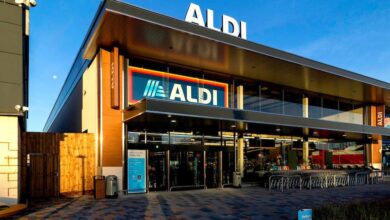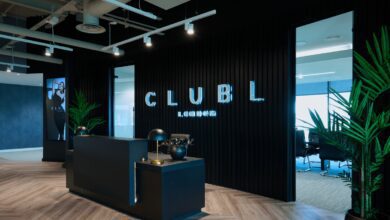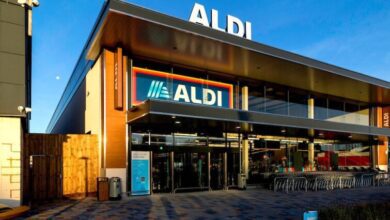
The demise of the high street and the evolution that part of retail is currently experiencing is extremely well documented. But one area that is not so well covered is the rise of Lidl & Aldi and their move towards dominance in the extremely valuable food retail market. This is Money reported in 2019 that the market share of the Big Four supermarkets had tumbled to a 15-year low at 62.7% as discounters Aldi & Lidl’s market share rose to 14.1%. Their aggressive expansion has moved the market away from a ‘Big 4’ and towards what we would suggest could aptly be labelled a ‘Big 6’ as they move into the same league as the big boys.
Driving through most towns in the UK you will pass at least one during your journey and may note the prominence of their location. Whether it’s off an A road, abutting a major roundabout or a stone’s throw from the town centre, they always occupy exceptional positions. They thrive off prominence and combine this with clear signage and easy access for customers to make the whole experience user friendly. For the last few years, they have somewhat had the pick of the best locations in towns and cities up and down the country whilst being the favoured retail tenant for property owners. For landlords owning sites that are in roadside locations, out of town and with a degree of prominence they are the desired occupier, not only ahead of other food stores, but also the majority of other retail occupiers. So, why are Aldi and Lidl snapping up all of the best sites?
-
Attractive Leases
They have rather cunningly designed their business model so that they have the ability to enter into lease agreements that are highly attractive to property landlords and institutional investors. The leases are desirable for the following reasons:
- 15–20 year term certain. This means that the lease term is guaranteed for this minimum period of time which is obviously attractive and far longer than most tenants sign up to. The market norm is around 5 years.
- High rents. Both of the occupiers are paying market leading rents compared to the competition.
- Fixed rent reviews every five years which are upwards only in line with CPI or RPI. This is extremely valuable to landlords as it ensures that the rent they receive will increase in line with inflation.
2. Excellent covenant strength
A landlord will always assess the financial strength and stability of a prospective tenant. A quick look at a credit report on both Lidl and Aldi shows a Dun & Bradstreet rating of 5A1, representing a minimum risk of business failure. Both businesses are therefore excellent tenants from a financial and stability point of view and the owner can be confident that they are not going to become bankrupt and unable to fulfil their rent commitments.
3. Bulletproof business model
Landlords are aware of the unpredictable world we live in and the impact of this is no more prevalent than in the retail market. For that reason, it is essential to find a retail tenant who can negotiate adversity flexibly and Lidl & Aldi have the perfect business model for this. Good quality products that are also well priced means that even during an economic downturn, customers will still return to shop with them, whilst most other retailers will be losing out. Even during a pandemic they can remain open and the public will always require food! For that reason, they are a secure tenant through the good times and the bad.
4. Aggressive acquisition team and clear target locations
Acquiring leases on prime real estate requires a strong team to make the relationships, identify sites and ensure the process runs smoothly. Lidl & Aldi have invested well in their acquisition team which is well covered and identifies the opportunity locations for them to set up a store. They are also very clear about their requirements and these are easily findable on their website. Most prudent property owners are aware of Lidl &Aldi target locations and these are well advertised.
5. Simple specification
From a property developer’s point of view, the Aldi & Lidl specification is nice and simple which helps to easily facilitate them on the site. They have a very clear required number of car parking spaces and a requirement for a store built to a shell which has appropriate access for deliveries. These clear specifications mean it is not a convoluted arrangement when it comes to welcoming them onto your site and helps expedite the process.
6. Flexibility
Both have shown to be flexible with regards to the space that they can take. We have seen Lidl & Aldi being imaginative with the repurposing of space, for example Lidl converting an old Homebase on the London Road in High Wycombe and their recent purchase of a High Street premises in Marlow. They are adaptable and will work with the property if the location is right. The recent purchase in Marlow also shows their push into more affluent areas where they are finding a strong level of demand.
Lidl & Aldi have big plans for the UK market and over the last few years they have certainly got their site acquisition strategy right. This has come from an understanding of what landlords want from a tenant. They have manufactured a position where they have access, and almost a first right of refusal to a lot of the most prominent sites throughout the UK. They appreciate that offering a lease arrangement that is attractive to the property market means that they will be given the best opportunities. This is backed up by their excellent covenant strength, clear strategy, flexibility and bulletproof business model which is making them a well desired tenant in the real estate world and a force to be reckoned with in the food retail world.









